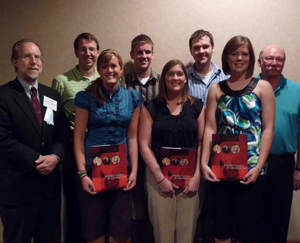 |
Pictured from left to right inn the back row are Richie Nelson, John Olley, Timothy Smith and James Turpen, Ph.D.; front row — Sandy Goodman of the Nebraska Coalition for Lifesaving Cures president, Kelly Wanzeck, Katie Peterson and Kyla Ronhovde. |
The awards were announced at the annual conference in Grand Island for students in the Institutional Development Award Program (IDeA). The IDeA program includes students participating in the Networks of Biomedical Research Excellence (INBRE) and the Biomedical Research Infrastructure Network (BRIN).
First, second and third place awards were given to the top oral and poster presenters. The awards were accompanied by a $500, $450 or $400 cash prize.
John Olley of Creighton University, Kelley Wanzeck of Creighton University and Kyla Ronhovde of Doane College received oral presentation awards. Richie Nelson of Nebraska Wesleyan University, Katie Peterson of Wayne State College and Tim Smith of Creighton University won for their poster presentations
The awards were named in honor of Richard Holland, an Omaha philanthropist and longtime supporter of research.
“We want to encourage students to pursue careers in research and reward excellence,” said Sandy Goodman, coalition president.
Nelson, who won first place for his poster looking into what increases the motility of ovarian cancer cells, said he is definitely going to pursue a career in research once he graduates.
“Because of the experience I’ve had as a BRIN scholar, I have decided that research is something I definitely want to do,” he said.
|
|
“BRIN is a great opportunity to explore the world of research. I would encourage any student who is interested in research to give it a try,” he said.
The INBRE/BRIN program is directed by James Turpen, Ph.D., a professor in the UNMC Department of Genetics, Cell Biology and Anatomy and principal investigator of the $17 million National Institutes of Health grant that supports the program.
Established in 2001, the BRIN program was created to expose students to serious biomedical research, build a statewide biomedical research infrastructure between undergraduate and graduate institutions and to strengthen each undergraduate institution’s infrastructure and increase its capacity to conduct cutting-edge biomedical and behavioral research.
The students, referred to as BRIN scholars, enter the program after completing their sophomore year of college upon recommendation by their college professors.
For more information on the INBRE/BRIN programs, contact Dr. Turpen at 559-4388 or jturpen@unmc.edu.